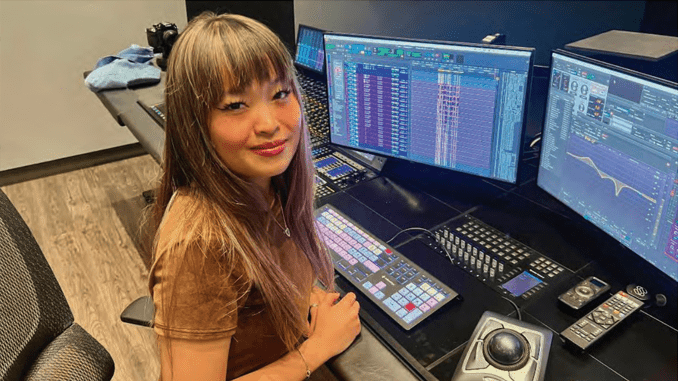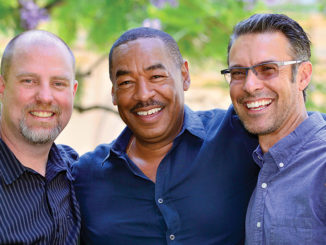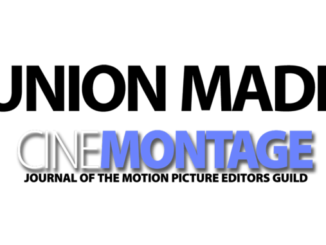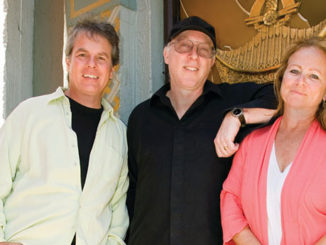
Q: Where are you currently employed?
I am currently employed at Signature Post as a mix technician, but I also freelance at different facilities as a dialogue editor, re-recording mixer, and mix technician.
Q: Current projects?
My recent credits include dialogue editor on Amazon Prime Video’s documentary “Reggie” and the Sundance Film Festival feature film “King Coal,” mix technician on Brie Larson’s latest Apple TV+ series “Lessons in Chemistry,” and Searchlight’s feature film “Chevalier.”
Q: Describe your job.
As a mix technician, I work closely with re-recording mixers and post producers in order to set up the technical requirements for feature films and television series so that the sound mix is recorded and delivered correctly for release. My job as a dialogue editor requires me to edit, fill sound dropouts with ambience/room tones from the specific takes and angles, and clean up production recordings for episodic series, feature films, and documentaries. This includes filling sound dropouts with ambience/room tones from the specific takes and angles, finding and editing alternate takes as needed, and deciding which audio of the three microphone types that simultaneously record production sound will need to be edited in—boom, lavalier, sometimes plant microphones, or all microphones—to create the best possible dialogue track.
Q: How did you first become interested in this line of work?
I have always been fascinated with sound in films. I grew up singing and playing piano and studied classical music and jazz for many years. While pursuing a Film and Media Scoring degree at Berklee College of Music, I was exposed to the re-cording studio for the first time and ended up adding a major in Music Production and Engineering. During my studies, I fell in love with the creativity and storytelling process of post-production audio, and as soon as I graduated, I moved to LA to pursue a career in the industry.
Q: Who gave you your first break?
I got my first big opportunity in the film and television industry from my mentors, sound editor Alexandra Fehrman and re-recording mixer Rich Weingart. They brought me on to be the mix technician for the Emmy-nominated series “The Boys.” Through Alexandra, I have been offered many opportunities to mix and supervise indie films and documentaries. My first big opportunity in the video game industry came from Duncan Brown at Formosa Interactive. I worked as the supervising dialogue editor for video game series such as “League of Legends” and “Call of Duty” as well as “Ori and the Will of the Wisps,” for which I was a nominee for dialogue editing at the Motion Picture Sound Editor (MPSE) Awards.
Q: What was your first union job?
My first union job was working as a mix technician on a Netflix series, “Archive 81.”
Q: What credits or projects are you proudest of, and why?
“The Boys,” “Ori and the Will of the Wisps,” “Chevalier,” “Spellers,” and “King Coal.” I worked as a mix technician on “The Boys” and “Chevalier.” That I got to be a part of the sound team for “The Boys” was very surreal for me because I was such a big fan. It was challenging yet extremely fun. Seeing the whole soundscape come to life—the balance between sound effects and music for the big superhero fights—always feels incredibly impactful on the mix stage. About “Chevalier,” I am proud to have been part of a film that tells the story of a historic figure who was a talented musician, composer, and revolutionary leader. I also worked as the lead dialogue editor for the video game “Ori and the Will of the Wisps” and the documentary “King Coal.” For “Ori,” I got to make the creative decisions on combining vowel sounds to create a brand new language for all the creatures in the game. And for “King Coal,” besides editing and cleaning up the production recordings, I got to work closely with director Elaine McMillion Sheldon to place each line of voiceover into the film. For the documentary “Spellers,” I mixed the score and pre-mixed the music. I’m grateful to have been a part of a film that raises audience awareness of autistic non-speakers’ journeys to communicate in the world.
Q: What was your biggest challenge in your job (or on a particular project) and how did you overcome/solve it?
In general, the biggest challenge of being a mix technician is to pay attention to all the little technical details and to create complicated technical setups under pressure. Over the years of working this job, I’ve used every project experience to develop a checklist so I can confirm that I’m executing all the crucial steps of each project’s workflow.
Q: What’s the most fun you’ve had at work?
It’s fun for me when the content I work on inspires me. The storytelling process is what drew me into the film and television industry initially, and to help tell impactful stories is where I have the most fun and feel the most inspired.
Q: Jobwise, what do you hope to be doing five years from now?
I would love to be able to continue my work on inspiring stories, mixing and supervising, and mastering my professional skills.
Q: What are your outside activities, hobbies, passions?
I love to dance. I take craft lessons such as pottery making. I also enjoy traveling and off-roading. When I’m not at work, I try to spend my time surrounded by nature, and I participate in community classes to learn new things.
Q: Favorite movie(s)? Why?
I have so many favorites! One of my all-time favorite movies is Stephen Chow’s “Kung Fu Hustle.” I’ll always remember watching it with my dad when I was a kid. I’ve watched it multiple times at different stages of my life. When I was a kid, I hadn’t learned to appreciate my own culture; all I remembered was giggling with my dad at all the film’s funny moments. But watching it again as an adult living in a different country made me homesick, and I realized the movie was about loving deeply and supporting your community. I am also a big fan of Miyazaki’s work, including “Spirited Away” and “Ponyo.”
Q: Favorite TV program(s)? Why?
One of my favorite TV series is “Black Mirror.” I find it highly thought-provoking and at times a little too scary to think about how realistic it is. The plotline for each episode is so different and constantly keeps me on my toes. Another one of my favorite series is “BoJack Horseman.” Living in LA, I often found the story to be very relatable. That animated series can make me feel sad or it can make me feel peaceful. I really enjoyed watching it.
Q: Do you have an industry mentor?
I have many! My mentors include Alexandra Fehrman and Richard Weingart who taught me a lot about mixing. From Daniel Raphael, Bryan Parker, and Mark Relyea, I learned so much about editorial. I also have to give a shoutout to Alex Gerbrandt, Duncan McRae, and Caleb Hollenback who mentored me when I first started mix-teching. I would not be where I am today without my mentors.
Q: What advice would you offer to someone interested in pursuing your line of work?
I recommend people take the time to train. Be detail-oriented; you can never be too careful! Take time to practice, and present your work to your mentors for feedback. When you get opportunities to work alongside people who have been in the industry for decades, you will learn from the best. Don’t waste that opportunity, and don’t be afraid to reach out and branch out!
Q: Was there ever a circumstance when you had to rely on the Guild for help or assistance?
I haven’t personally needed help or assistance from the Guild yet, but I know they’re here for me if anything were to come up.
Q: Is there anything you’d like to say to your fellow Guild members, some words of encouragement?
We are very lucky to have this community, to have a labor union that keeps us together and helps us stand up for our rights. I hope to connect with more Guild members and that we always remember how important it is to support each other.
—Compiled by David Bruskin





